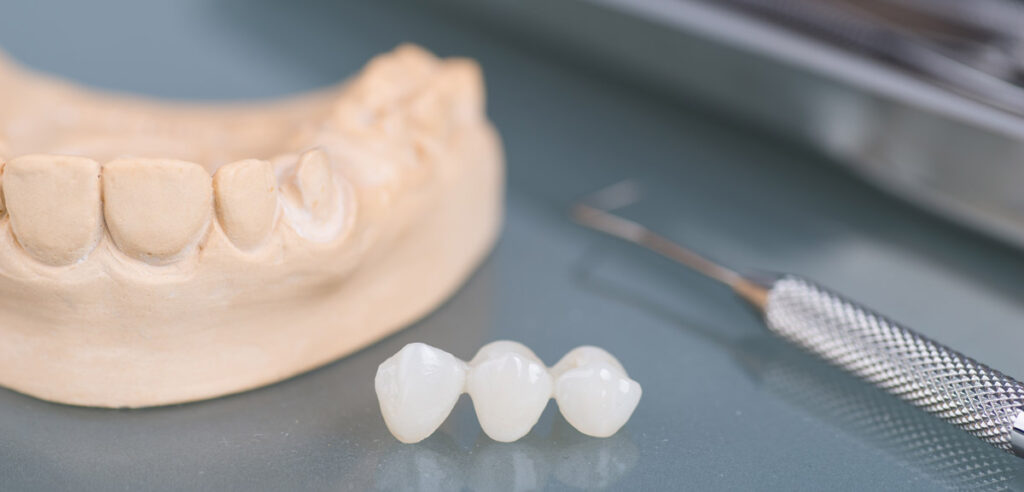Losing a tooth can affect your confidence, oral health, and ability to eat or speak properly. Whether you have a missing front tooth or need to replace missing teeth elsewhere in your mouth, there are several options available.
In this blog post, we’ll explore the best ways to replace a tooth, comparing dental implants, dental bridges, and dentures to help you find the right solution.
The importance of a complete smile
A full set of natural teeth is essential for proper chewing, clear speech, and a confident smile. When even a single tooth is missing, the balance of your mouth is disrupted. Over time, this can lead to misalignment, increased wear on existing teeth, and even bone loss in the jaw.
Beyond physical concerns, many patients feel self-conscious about gaps in their smile. This can impact their confidence in social and professional settings. Replacing a missing tooth isn’t just about aesthetics. Whether you’re missing one tooth, or want to change up all your teeth, it’s about maintaining the health and function of your mouth for years to come.

Understanding tooth loss
Common causes: decay, trauma, and gum disease
There are several reasons why people lose teeth, including:
- Tooth decay – Severe decay can weaken a tooth to the point where extraction is necessary.
- Gum disease – Advanced periodontal disease can lead to bone loss, making it difficult to support existing teeth.
- Injury or trauma – Accidents, sports injuries, or falls can knock out a real tooth or damage it beyond repair.
The consequences of not replacing a missing tooth
A missing tooth can lead to several problems over time. Neighbouring teeth may shift into the gap, which can change your bite and lead to misalignment, increasing the risk of decay and gum disease due to harder cleaning between teeth.
The remaining teeth also face increased pressure, leading to faster wear, especially on opposing teeth. Over time, this can weaken them, making them more susceptible to damage or tooth loss.
Additionally, the jaw bone will begin to deteriorate without the stimulation provided by a real tooth. This can alter the structure of your face and make it more difficult to place dental implants in the future. A missing tooth can also cause difficulties with chewing and speech, particularly if it’s in a visible area like the front of the mouth. Getting the necessary treatment to replace the tooth promptly helps prevent these long-term complications.
Assessing your tooth replacement needs
When deciding how to replace a missing tooth, consider whether you are missing a single tooth or multiple teeth. For a single tooth, dental implants or a dental bridge are ideal solutions. If you’re missing several teeth, partial dentures or a full set of dentures may be necessary. Each option suits different needs depending on the number of teeth lost and your oral health.

Dental implants: a permanent solution
What is a dental implant?
A dental implant is a titanium post surgically placed in the jaw bone to replace the root of a missing tooth. Over a few months, the implant fuses with the bone, creating a strong foundation for a new crown.
Advantages of dental implants
- Functions like a real tooth, maintaining a natural smile: A dental implant looks, feels, and functions like a natural tooth, allowing you to eat, speak, and smile confidently. It provides the same stability as your natural teeth and blends seamlessly with the rest.
- Prevents bone loss by stimulating the jaw bone: Implants stimulate the jaw bone, preventing bone loss and helping maintain its density, which is essential for facial structure and overall oral health.
- Long-lasting, often for a lifetime with proper care: With good care and regular check-ups, dental implants can last a lifetime, making them a highly durable and cost-effective solution compared to other options like dentures or bridges.
The implant procedure
The process of getting a dental implant begins with a consultation, where the dentist evaluates your jaw bone and overall oral health to ensure that you are a suitable candidate for the procedure.
Following this, surgery is performed, during which a titanium post is placed into the jawbone under local anaesthetic. This allows the implant to fuse with the bone during the healing period, which typically takes a few months.
Once healing is complete, a new crown is attached to the implant, restoring both the function and aesthetics of the missing tooth.

Dental bridges: a fixed alternative
A dental bridge replaces a missing tooth by anchoring a new crown to adjacent teeth, providing a permanent solution that restores function and appearance. It is securely cemented, offering a fixed, non-removable alternative to dentures.
How bridges work: types and materials
Bridges use adjacent teeth as anchors to support a new crown, with a pontic (false tooth) filling the gap. They are made from materials like porcelain, ceramic, or metal, with porcelain and ceramic being preferred for their natural appearance, and metal being more durable for back teeth.
Who is a good candidate for a bridge?
Dental bridges are suitable for those with healthy, strong surrounding teeth that can support the new crown. It’s also an excellent choice for those who prefer a non-surgical option, especially if implants are not viable due to bone loss or other reasons.
Dentures: a removable option
Wearing dentures is a popular option for replacing missing teeth. As well as being fully removable, they come in different types, each suited for specific needs.
Full dentures are used when all the teeth in the upper or lower jaw are missing, providing a complete set to restore your smile and chewing ability.
Partial dentures are ideal for those with a few missing teeth, filling in the gaps and often secured with metal clasps that attach to existing teeth.
For more stability, implant-supported dentures are an option, where the dentures are anchored to dental implants, providing a more secure fit and preventing bone loss.
Adjusting to life with dentures can take time. Initially, eating softer foods and practising speaking can help ease the transition. Regular visits to your dental practice are essential to ensure the dentures fit properly, as the shape of your mouth may change over time, preventing discomfort and ensuring optimal function.

Cost considerations for tooth replacement
The cost of tooth replacement varies based on the treatment type, such as dental implants, bridges, or dentures. While dental implants tend to be more expensive initially, they are often more durable, while dentures and bridges may require more maintenance over time.
Financing options and payment plans
Many dental practices offer financing options and payment plans to help spread the cost of treatment. Checking with your dentist can provide information on the available plans, making it easier to manage the cost and achieve a complete smile without financial strain.
Medicred: your new tooth made affordable
Finding the right solution to replace a missing tooth can be daunting, especially when you consider the costs involved with this.
At Medicred, we believe that everyone deserves a confident, healthy smile. That’s why we offer flexible and affordable financing options to make tooth replacement treatments accessible for all.
Whether you’re considering dental implants, bridges, or dentures, applying for one of our payment plans helps you get the care you need without the financial strain. We’re here to support you through your dental journey, ensuring you can restore your smile and improve your oral health.
Let us help you make your new tooth affordable and within reach today!